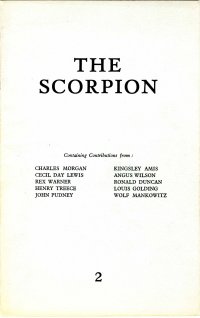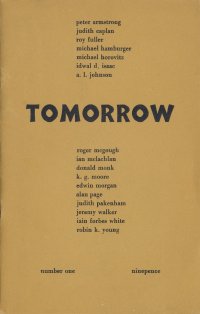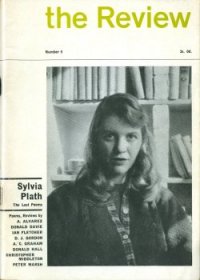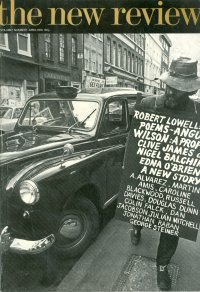|
The Magazines
Ian Hamilton edited four magazines
throughout his career: The Scorpion, Tomorrow, The
Review, and The New Review. He later considered The
Scorpion and Tomorrow his apprenticeship as an editor,
but these early attempts nonetheless reveal a serious regard for literary
quality that would come to define the more developed efforts of The
Review and The New Review. (Note: Click on the cover
images below to view each issue cover with accompanying index of contents
for Tomorrow, The
Review and The New Review).
The Scorpion (1955)
 |
'[The Scorpion] was pretty
tame stuff. I put a certain amount of bile into the editorials, but
they didn't really connect with the rest - which consisted of the
usual morose adolescent parables and things like that. The first issue
had a foreword by John Wain, the novelist, who had just appeared then
and was very famous. I wrote to him to ask if there was some message
he could send to youthful aspirants and he did. It was rather good,
about half a page, which ended: 'and, if all this fails, back to the
drawing-board!' - a phrase I didn't know then. The second issue again
showed this wish to connect with the London literary world. I sent
a questionnaire to various luminaries asking if there was advice that
they would wish to give to young authors at the beginning of their
literary careers. [...] There would be some names that would not be
recognised now; figures like Louis Golding who was popular in that
day. I just picked them out of some magazine or book. So about half
of this combative magazine, this Scorpion, was filled with these platitudes
from London literary figures.' (Ian Hamilton in Conversation with
Dan Jacobson)
Tomorrow (1959-1960)
 |
Click Cover to View
Complete Index
|
'I'd enjoyed bringing out The Scorpion and had always remembered it. Then I met a Sri Lankan,
Susil Pieris, who was very keen and I think he coedited the first
two issues of Tomorrow. Then he got fed up or drifted away.
It began, however, with my feeling that I wanted to start a magazine.
'For its fourth issue I'd written
to Pinter. He had just become prominent then, but I'd learned about
him earlier, when I was in Germany. Another of my jobs there had
been to work on this radio show, and one of the things I did for
it was write a report on a local drama festival. There was a play
in the festival by a person I'd read about in the Sunday papers.
The Room, it was called, and it was by Harold Pinter. It
had had a good review from Harold Hobson in the Sunday Times,
but rather dismissive reviews by other people. Anyway I was intrigued
by this play, and liked it best of all those put on during the festival
- and said so in my radio report. But I'd left the proceedings early
in order to write the piece; I hadn't stayed to hear the commanding
officer of the Second Tactical Air Force, who was giving the prize
to some Somerset Maugham thing, denounce this incomprehensible piece
of garbage by someone called H. Pinters, saying how he just couldn't
understand how anybody in their right mind could have put it on.
The next day my piece was broadcast on the radio, praising that
very play. My immediate superior, who was the information officer,
got hauled up by the commanding officer and told to discipline me.
What I had done was "tantamount to disobeying an order"
'. (Ian Hamilton in Conversation with Dan Jacobson)
The Review (1962-1972)
|
|
Click Cover to View
Complete Index
|
'The Review was started
to cope with the aftermath of this magazine called Tomorrow, the
one that published the Pinter play. The tendency for me was to start
another magazine in order to reassure the printer that I hadn't
really gone out of business, that he would be paid eventually. OK,
the magazine I handed to him (the Review, No. 1) had another title
and two years had passed since the last time I'd given him anything
to print (i.e. Tomorrow, No. 4), but he agreed to do it. He was
still hoping to get paid for the Tomorrow work - and was paid for
it, in the end.
'We had a committee consisting
of John Fuller, Francis Hope, Martin Dodsworth, Colin Falck, Michael
Fried and Gabriel Pearson. We never had meetings or anything like
that. There was a lot of correspondence, because John went to Buffalo
for a year. So he wrote to me a lot from there. And Michael and
Colin had already left Oxford and gone off to London, where they
shared a flat. Michael, a young American poet, was a big influence
on me at that time. Very few members of the committee were around
in Oxford, although the thing was based in Oxford'. (Ian
Hamilton in Conversation with Dan Jacobson)
The New Review (1974-1979)
|
|
Click Cover to View
Complete Index
|
'In some way I wanted something
larger than a little magazine. As it happened, the Arts Council
had kept aside some money for this counter-Encounter, not
a great deal, but it was just lying there. Charles Osborne, who
was literature director of the Council at that point, saw no reason
why, if I reinvented the Review as a new monthly magazine,
that money - I think about £20,000 - couldn't go to launch one issue
of it. And that's how the New Review began. A year later,
in April 1974, it appeared, coinciding happily with nationwide labour
troubles and Edward Heath's three-day week; and of course it was
large and plush - and expensive to buy. I wanted something that
looked good. I think now it stands up pretty well in terms of its
appearance.
'We didn't know it was going to
be such a minority magazine when we started it. I'd looked at a
lot of magazines in America. They have a thriving magazine culture
there. We don't. But I didn't see why we shouldn't. I made the mistake
of getting a proper professional designer who had lots of expressive
ideas and I was too keen on using pictures. Looking back, I think
I should probably have done it differently, but I didn't, so there
it was. And it still looks pretty okay to me and has some really
quite good stuff in it. Anyway it did come under a lot of fire on
all the waste-of-public-money issues - which was bollocks, because
public money paid only for about half of any single issue. The Arts
Council never did pay for the New Review. In fact, the whole
connection with the Council was a bit of a burden, because of the
way they doled it out. You were always having to go and see them
to ask for some public money to pay for the last issue, so that
you could do the next one. The grant for issue three had to go on
issue two. But the money problem was extreme; it was the Review
times ten. I was the manager of this magazine and I discovered I
didn't know how to run a business. I thought I did. Looking back,
that side of it was a complete shambles'. (Ian Hamilton in Conversation
with Dan Jacobson)
All quotes are excerpted from
Ian Hamilton in Conversation with Dan Jacobson. London: Between
the Lines, 2002.
|







